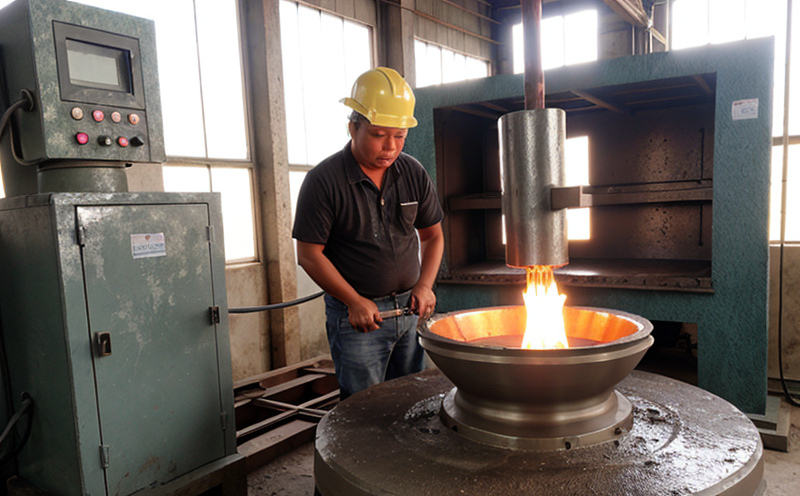ASTM A703 Steel Castings Quality Standard Testing
The ASTM A703 standard specifies requirements for steel castings used in various industrial applications. These castings are crucial components in the manufacturing sector, providing structural integrity and performance under extreme conditions. The testing regimen outlined by ASTM A703 ensures that these castings meet stringent quality standards, thereby enhancing product reliability and safety.
ASTM A703 covers several grades of carbon steel castings, each designed for specific applications based on their chemical composition and mechanical properties. Testing according to this standard is mandatory for manufacturers aiming to comply with international specifications and ensure the integrity of their products.
The testing process involves a series of non-destructive tests (NDT) and destructive tests to evaluate various aspects such as surface finish, internal structure, and mechanical properties. Non-destructive tests include magnetic particle inspection, ultrasonic testing, and visual examination. Destructive tests encompass tensile strength tests, hardness tests, and impact property tests.
Surface finish is assessed through visual examination or profilometry to ensure that the casting meets the specified requirements for a smooth surface. Internal structure evaluation involves microstructural analysis using optical or scanning electron microscopy (SEM) to confirm the correct grain size and morphology as per ASTM A703.
Mechanical properties are evaluated by conducting tensile tests on samples cut from the castings. The test specimens are typically machined according to specified dimensions, ensuring consistency in testing results. Hardness is determined using Rockwell or Brinell hardness testers, while impact property tests assess the ductility and toughness of the material.
ASTM A703 also mandates chemical analysis to ensure that the castings contain the required alloying elements within specified limits. This ensures that the mechanical properties align with the intended application. The testing process is comprehensive, involving a combination of non-destructive and destructive tests tailored to identify any defects or inconsistencies.
- Non-destructive tests include magnetic particle inspection for detecting surface and near-surface flaws.
- Ultrasonic testing helps in identifying internal defects such as cracks or porosity.
- Mechanical properties are tested through tensile, hardness, and impact property tests on representative samples.
The results of these tests provide a detailed report outlining the compliance with ASTM A703 standards. This ensures that manufacturers meet the quality benchmarks set by leading international standards. Compliance with ASTM A703 not only enhances product reliability but also fosters trust among end-users and stakeholders.
ASTM A703 is widely recognized for its stringent requirements, ensuring consistent quality across different applications. Manufacturers who adhere to this standard are better positioned to meet the demands of a global market, where quality and safety are paramount. The testing process is rigorous and involves multiple steps to ensure that every aspect of the casting meets the specified criteria.
Why Choose This Test
Selecting ASTM A703 steel castings for your quality standard testing offers numerous advantages. Firstly, it ensures compliance with international standards, which is crucial in a global market where regulatory requirements vary by region. Compliance with ASTM A703 guarantees that the castings meet stringent quality benchmarks, thereby enhancing product reliability and safety.
Secondly, this test regimen provides comprehensive evaluation of various aspects of steel castings. Non-destructive tests such as magnetic particle inspection and ultrasonic testing help in identifying surface and internal defects without compromising the integrity of the casting. Destructive tests like tensile strength and hardness tests ensure that the mechanical properties meet the specified requirements.
Thirdly, ASTM A703 testing enhances trust among end-users and stakeholders by demonstrating a commitment to quality and safety. This is particularly important in industries where product reliability and performance are critical, such as automotive, aerospace, and construction sectors. By adhering to this standard, manufacturers can build a strong reputation for delivering high-quality products.
Finally, compliance with ASTM A703 provides peace of mind that the castings meet all relevant standards and specifications. This reduces the risk of product failures or recalls, which can be costly and damaging to a company's reputation. The rigorous testing process ensures that every aspect of the casting is evaluated thoroughly, minimizing the likelihood of defects.
Environmental and Sustainability Contributions
- ASTM A703 steel castings contribute to sustainability by ensuring the durability and longevity of products. Durable components reduce the need for frequent replacements, thereby minimizing waste.
- The use of ASTM A703 certified castings supports eco-friendly practices by promoting the use of high-quality materials that are less prone to failure.
- Compliance with this standard ensures that manufacturers adhere to environmental regulations and contribute positively to sustainable development goals.
Competitive Advantage and Market Impact
Adhering to ASTM A703 standards provides a significant competitive advantage in the market. It demonstrates a commitment to quality, reliability, and safety, which are essential for building trust among end-users and stakeholders.
Compliance with this standard ensures that products meet international specifications, making them suitable for global markets. This opens up opportunities for exporters who can leverage their compliance as a selling point in competitive bidding processes.
The rigorous testing process outlined by ASTM A703 not only enhances product reliability but also differentiates manufacturers from competitors who may not adhere to such stringent standards. This can lead to higher customer satisfaction and increased market share.
Moreover, compliance with ASTM A703 can help manufacturers secure long-term contracts with reputable clients, as it ensures that the products meet high-quality benchmarks consistently over time. This fosters a reputation for excellence and reliability, which is invaluable in today's competitive business environment.





